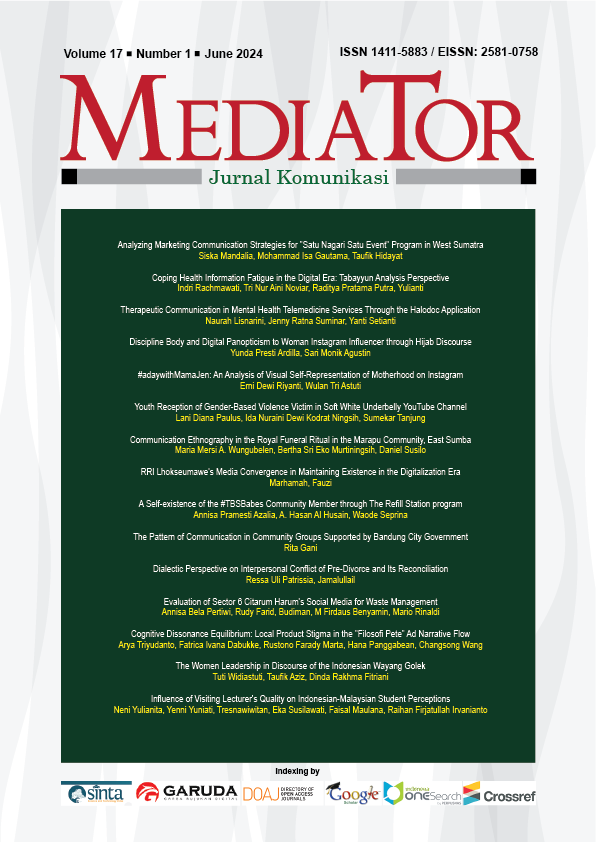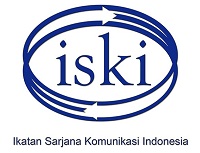#adaywithMamaJen: An Analysis of Visual Self-Representation of Motherhood on Instagram
DOI:
https://doi.org/10.29313/mediator.v17i1.2456Keywords:
self-representation, motherhood, instagram, influencerAbstract
Motherhood is culturally expected and requires women to conform to societal ideology, creating 'good mothers' ideals and media commercialization. With the growing number of social media influencers, especially on Instagram, the study aims to examine the meaning of the visual self-representation shown by the Instagram account of Jennifer Bachdim (JB) and connects to the roles of motherhood portrayed by the account. The account showcases JB's work as a mother, entrepreneur, and influencer in beauty and wellness. The study applied but was not limited to, Machin & Mayr’s multimodal critical discourse analysis and Rettberg’s self-representation theory to analyze JB’s selected reels. The results indicate that JB's selected reels represent her notion of being 'busy' as a mother of four children, entrepreneur, and influencer; yet the representation that JB builds negates the presence of helping hands in her family life. Also, JB creates a self-representation of motherhood to attract attention and followers, influencing and reshaping the media's image of successful mothers, and reinforcing intensive mothering ideology. In the selected reels, JB shapes an image closely associated with her motherhood roles. Consequently, the increasing number of followers subsequently contributes to her expanding business deals.
References
Abetz, J., & Moore, J. (2018). "Welcome to the Mommy Wars, Ladies": Making Sense of the Ideology of Combative Mothering in Mommy Blogs. Communication, Culture and Critique, 11(2), 265–281. https://doi.org/10.1093/ccc/tcy008
Chae, J. (2015). "Am I a Better Mother Than You?": Media and 21st-Century Motherhood in the Context of the Social Comparison Theory. Communication Research, 42(4), 503–525. https://doi.org/10.1177/0093650214534969
Christopher, K. (2012). Extensive mothering: Employed mothers' constructions of the good mother. Gender and Society, 26(1), 73–96. https://doi.org/10.1177/0891243211427700
Damaske, S. (2013). Work, family, and accounts of mothers' lives using discourse to navigate intensive mothering ideals. Sociology Compass, 7(6), 436–444. https://doi.org/10.1111/soc4.12043
Gleeson, D. M., Craswell, A., & Jones, C. M. (2019). Women's use of social networking sites related to childbearing: An integrative review. Women and Birth, 32(4), 294–302. https://doi.org/10.1016/j.wombi.2018.10.010
Gleeson, D. M., Craswell, A., & Jones, C. M. (2022). It takes a virtual village: Childbearing women's experience of a closed Facebook support group for mothers. Women and Birth, 35(2), e172–e180. https://doi.org/10.1016/j.wombi.2021.04.011
Güzel, E. (2023). Beautiful, Sexy, and Happy Celebrities: Perfect Mothers or Instamoms. Journal of International Women's Studies, 25(3).
Hartoyo, N. M., & Supriadi, D. (2015). Aktivisme Sosial Melalui Penggunaan Media Sosial: Studi Kasus Asosiasi Ibu Menyusui Indonesia (Aimi). Jurnal Kajian Komunikasi, 3(1), 1–11. https://doi.org/10.24198/jkk.vol3n1.1
Holiday, S., Norman, M. S., & Densley, R. L. (2022). Sharenting and the extended self: self-representation in parents' Instagram presentations of their children. Popular Communication, 20(1), 1–15. https://doi.org/10.1080/15405702.2020.1744610
Hunter, A. (2015). Lesbian mommy blogging in Canada: Documenting subtle homophobia in Canadian society and building community online. Journal of Lesbian Studies, 19(2), 212–229. https://doi.org/10.1080/10894160.2015.969077
Hunter, A. (2016). Monetizing the mommy: Mommy blogs and the audience commodity. Information Communication and Society, 19(9), 1306–1320. https://doi.org/10.1080/1369118X.2016.1187642
Irwanto, I., & Hariatiningsih, L. R. (2019). Aktivitas Santap dan Minum Generasi Z pada Media Sosial Instagram. Mediator: Jurnal Komunikasi, 12(2), 141–154. https://doi.org/10.29313/mediator.v12i2.5048
Lamar, M. R., & Forbes, L. K. (2020). A phenomenological investigation into the role of intensive mothering in working mothers' career experiences. Journal of Counselor Leadership and Advocacy, 7(2), 147–162. https://doi.org/10.1080/2326716X.2020.1753596
Lund, N. F., Cohen, S. A., & Scarles, C. (2018). The power of social media storytelling in destination branding. Journal of Destination Marketing and Management, 8(May 2017), 271–280. https://doi.org/10.1016/j.jdmm.2017.05.003
Matley, D. (2020). "I miss my old life": Regretting motherhood on Mumsnet. Discourse, Context and Media, 37. https://doi.org/10.1016/j.dcm.2020.100417
Moore, J., & Abetz, J. (2016). "Uh, Oh. Cue the [New] mommy wars": The ideology of combative mothering in popular U.S. Newspaper articles about attachment parenting. Southern Communication Journal, 81(1), 49–62. https://doi.org/10.1080/1041794X.2015.1076026
Orton-Johnson, K. (2017). Mummy blogs and representations of motherhood: "Bad mummies" and their readers. Social Media and Society, 3(2). https://doi.org/10.1177/2056305117707186
Rahmawati, N. R., Septiana, N. Z., & Masitoh, F. (2019). Pola pengasuhan orangtua milenial. Proceeding of International Conference on Islamic Education: Challenges in Technology and Literacy, 1–9.
Raudasoja, M., Sorkkila, M., Laitila, A., & Aunola, K. (2022). "I feel many contradictory emotions": Finnish mothers' discursive struggles with motherhood. Journal of Marriage and Family, 84(3), 752–772. https://doi.org/10.1111/jomf.12828
Reid, C., Greaves, L., & Poole, N. (2008). British Columbia Centre of Excellence for Women's Health: Good, bad, thwarted, or addicted? Discourses of substance-using mothers. 28(2), 211–234.
Rettberg, J. W. (2014). We were seeing ourselves through technology (2nd ed.). Palgrave Macmillan. https://doi.org/10.1057/9781137476661.0001
Rettberg, J. W. (2018). Self-representation in social media. In J. Burgess, A. Marwick, & T. Poell (Eds.), The SAGE Handbook of Social Media (pp. 429–443). Sage. https://www.britannica.com/
Saul, H. (2016). Instafamous: Meet the social media influencers redefining celebrity. The Independent, 12. https://www.independent.co.uk/news/people/instagram-model-natasha-oakley-iskra-lawrence-kayla-itsines-kendall-jenner-jordyn-woods-a6907551.html
Setyastuti, Y., Suminar, J. R., Hadisiwi, P., & Zubair, F. (2019). Millennial moms: Social media as the preferred source of information about parenting in Indonesia. Library Philosophy and Practice, 2019.
Syafuddin, K., Jamalullail, & Nuruzzaman, M. (2023). The Propaganda of Intolerance Act on Instagram: Multimodal Discourse Analysis on #patungbundamaria. Mediator: Jurnal Komunikasi, 16(1), 130–143. https://doi.org/10.29313/mediator.v16i1.2357
Wegener, C., Jage-D’Aprile, F., & Plumeier, L. (2022a). Motherhood in social media: phenomena and consequences of the professionalization of mothers and their media (self-)representation. Feminist Media Studies, 00(00), 1–17. https://doi.org/10.1080/14680777.2022.2108479
Wegener, C., Jage-D’Aprile, F., & Plumeier, L. (2022b). Motherhood in social media: phenomena and consequences of the professionalization of mothers and their media (self-)representation. Feminist Media Studies, 00(00), 1–17. https://doi.org/10.1080/14680777.2022.2108479
Williamson, T., Wagstaff, D. L., Goodwin, J., & Smith, N. (2023). Mothering Ideology: A Qualitative Exploration of Mothers' Perceptions of Navigating Motherhood Pressures and Partner Relationships. Sex Roles, 88(1–2), 101–117. https://doi.org/10.1007/s11199-022-01345-7
Zappavigna, M. (2016). Social media photography: construing subjectivity in Instagram images. Visual Communication, 15(3), 271–292. https://doi.org/10.1177/1470357216643220
Zappavigna, M., & Zhao, S. (2017). Selfies in 'mommy blogging': An emerging visual genre. Discourse, Context and Media, 20, 239–247. https://doi.org/10.1016/j.dcm.2017.05.005
Zozaya-durazo, L., & Sádaba-chalezquer, C. (2022). Disguising Commercial Intentions: Sponsorship Disclosure Practices of Mexican Instamoms. Media and Communication, 10(1), 124–135. https://doi.org/10.17645/mac.v10i1.4640
Downloads
Published
Issue
Section
License
Copyright (c) 2024 Erni Dewi Riyanti, Wulan Tri Astuti

This work is licensed under a Creative Commons Attribution-ShareAlike 4.0 International License.
























